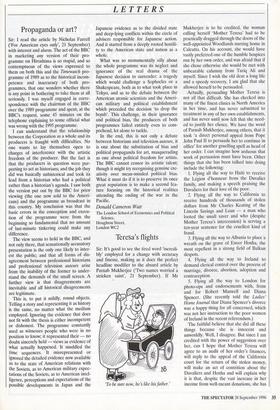LETTERS Propaganda or art?
Sir: I read the article by Nicholas Farrell ('For American eyes only', 21 September) with interest and alarm. The act of the BBC in marketing any version of their pro- gramme on Hiroshima is so stupid, and so contemptuous of the views expressed to them on both this and the Timewatch pro- gramme of 1989 as to the historical incom- petence and inaccuracy of both pro- grammes, that one wonders whether there is any point in bothering to take them at all seriously. I was myself engaged in corre- spondence with the chairman of the BBC over the 1989 programme and spent, at the BBC's request, some 45 minutes on the telephone explaining to some official what was wrong with the 1995 programme.
I can understand that the relationship between the Corporation as a whole and its producers is fraught with difficulties. No one wants to lay themselves open to charges of interference with the artistic freedom of the producer. But the fact is that the producers in question were pur- porting to act as historians; and the job they did was basically unhistorical and took its lead from a historian who had a political rather than a historian's agenda. I saw both the version put out by the BBC for prior viewing (the one now sold to the Ameri- cans) and the programme as broadcast in this country. My conclusion was that the basic errors in the conception and execu- tion of the programme were from the beginning so fundamental that no amount of last-minute tinkering could make any difference.
The view seems to hold in the BBC, and not only there, that sensationally accusatory presentation is the only one likely to inter- est the public; and that all forms of dis- agreement between professional historians and professional television auteurs arise from the inability of the former to under- stand the demands of the small screen. A further view is that disagreements are inevitable and all historical disagreements are legitimate. This is, to put it mildly, round objects. Telling a story and representing it as history is the same, no matter what the medium employed. Ignoring the evidence that does not fit with the thesis is either incompetent or dishonest. The programme constantly used as witnesses people who were in no position to know; it represented their — no doubt sincerely held — views as evidence of what actually happened. It muddled the time sequences. It misrepresented or ignored the detailed evidence now available as to the state of American relations with the Soviets, as to American military expec- tations of the Soviets, as to American intel- ligence, perceptions and expectations of the possible developments in Japan and the
Japanese evidence as to the divided state and deep-lying conflicts within the circle of advisers responsible for Japanese action. And it started from a deeply rooted hostili- ty to the American state and nation as a whole.
What was so monumentally silly about the whole programme was its neglect and ignorance of the real drama of the Japanese decision to surrender: a tragedy which would challenge a Sophocles or a Shakespeare, both as to what took place in Tokyo, and as to the debate between the American atomic scientists and the Ameri- can military and political establishment which preceded the decision 'to drop the bomb'. This challenge, in their ignorance and political bias, the producers of both programmes failed entirely even to com- prehend, let alone to tackle.
In the end, this is not only a debate between historians and television auteurs, it is one about the substitution of bias and political propaganda for art, masquerading as one about political freedom for artists. The BBC cannot censor its artistic talent; though it might try recognising genuine cre- ativity over mean-minded political bias. What it must do if it is to preserve its once great reputation is to make a second fea- ture focusing on the historical realities attending the ending of the war in the Pacific.
Donald Cameron Watt
The London School of Economics and Political Science, Houghton Street, London WC2


















































































 Previous page
Previous page